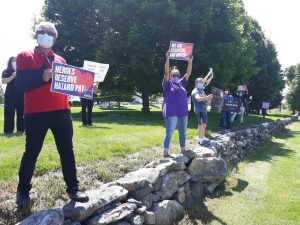Putnam Hospital Employees Demand Hazard Pay

By Gabriel Harrison
Healthcare workers at Putnam Hospital picketed yesterday for hazard pay after they say Nuvance management repeatedly refused to accommodate their demands.
Many said their jobs have been more difficult since COVID-19 reached the county while some employees said they have been pulled from their usual departments to perform jobs elsewhere. Extra shifts and longer hours are more common, they also said.
One worker said mandated double shifts are taking a toll on her health. She has a circulation issue, and standing for too long causes swelling in her legs.
“I just feel that… because of the circumstances and what we’ve had to work around that we should… be rewarded for our efforts,” said Angel Ruppert, another Putnam Hospital employee. Ruppert said she’s worked with COVID-19 patients.
“It’s scary,” Ruppert said. “It’s life threatening and we should be recognized for enduring that.”
Marcela Rojas, a public relations official for Putnam Hospital, provided a statement when asked about the picketing and hazard pay issue.
“Putnam Hospital supports all our employees, who have done an exceptional job during the COVID-19 pandemic,” she said. “As we face the challenges ahead, we will continue to work hard to meet the needs of our patients, staff and the community.”
One employee described limiting contact with family to protect her loved ones.
“We have been working like crazy,” said Nicole Lynch, who works on a medical-surgical unit. “We have been putting our lives on the line every time we set foot in this hospital to take care of others.”
In meetings earlier this week, hospital managers said there would be no additional hazard pay, according to several hospital employees.
“Management doesn’t really realize what it’s like when you’re in a hot zone and you have all your gear on and you’re in there for hours, sweating,” Lynch said. “When you’re taking care of a patient and they suddenly can’t breathe, and you’re trying your hardest.”
“It was hard mentally, it was hard emotionally, it was hard to see people – young people… die,” Lynch also noted. “We deserve to be fairly compensated for risking our lives every day to come to work,” she said.

Examiner Media – Keeping you informed with professionally-reported local news, features, and sports coverage.
